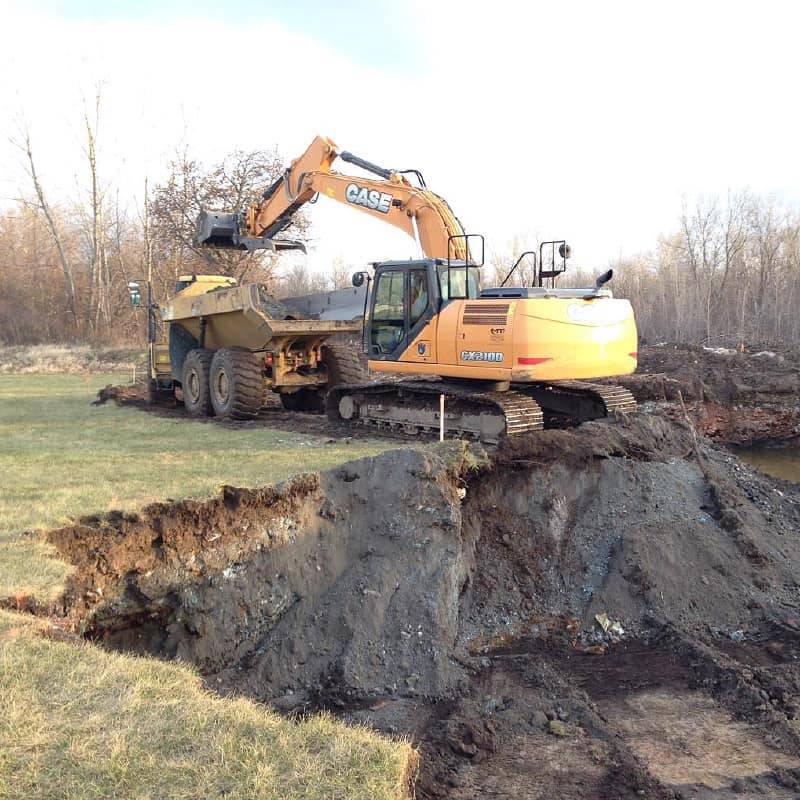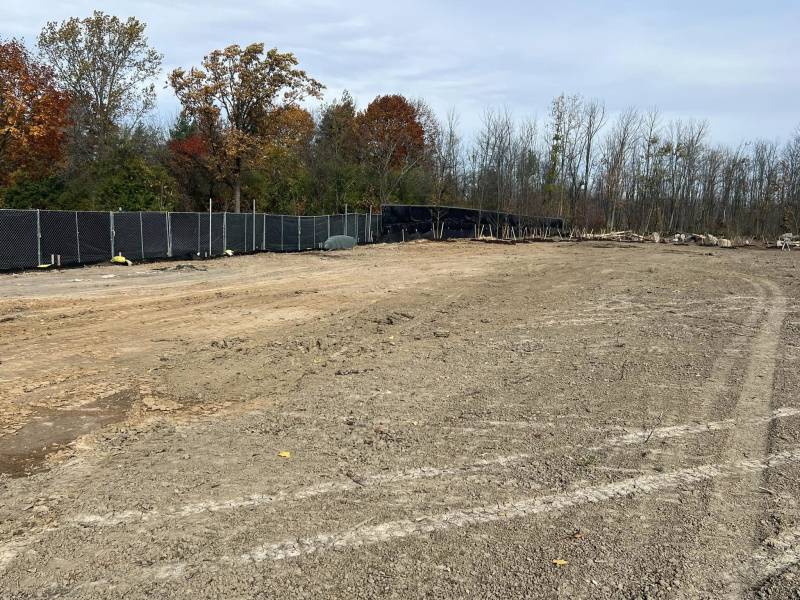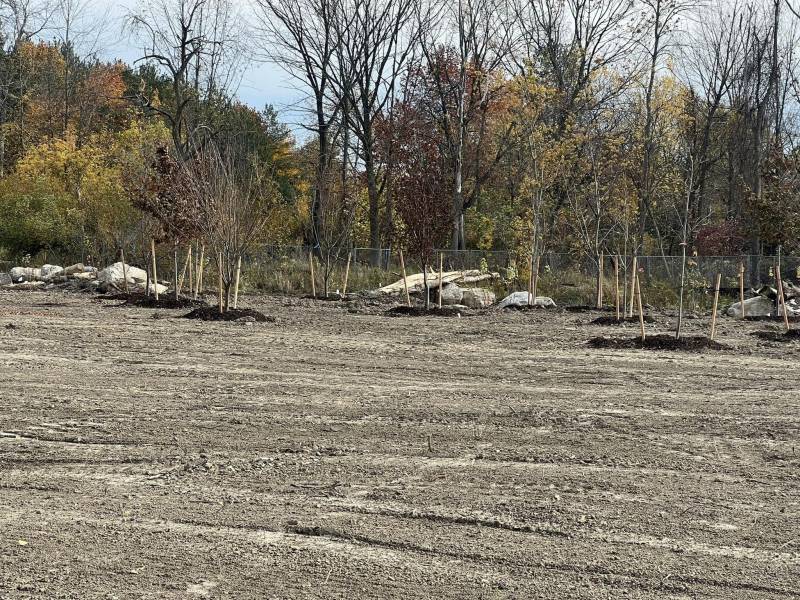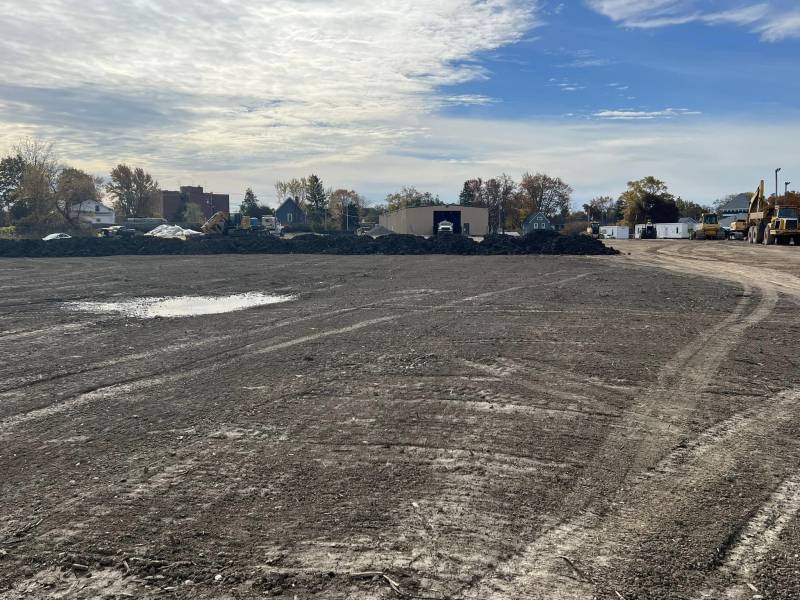Batavia Iron and Metal remediation produces more than expected, now complete
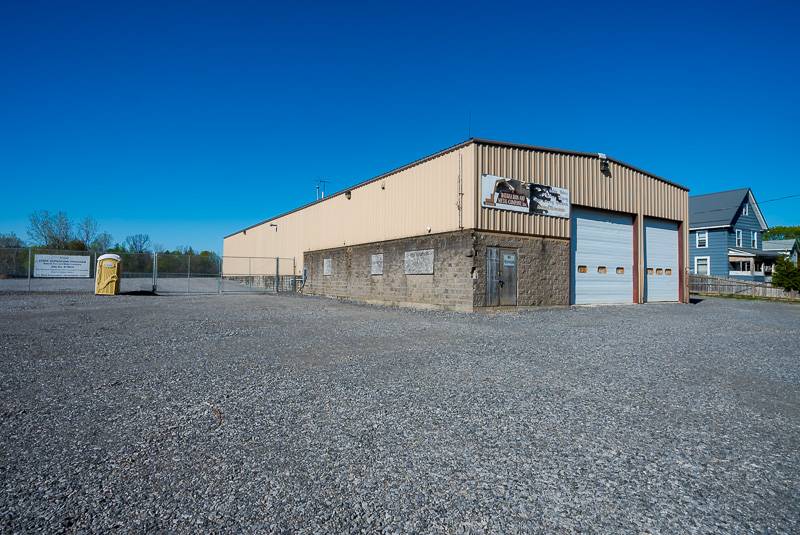
Photo by Howard Owens
A revised remedial plan was issued for work completed at the Batavia Iron Metal facility in Batavia due to the amount of PCBs and other contaminants and wetlands discovered at the Bank Street site, Project Manager Lisa Gorton says.
The state Department of Environmental Conservation issued the revision Wednesday now that all work has been completed for the project at the defunct metals processing plant next to Dwyer Stadium.
"So, initially, those smaller areas that were identified were going to be removed and remediated. However, after our full investigation and design, we ended up removing much more waste than expected. So we essentially just cleaned the site up to a restricted residential use and commercial use standard, so it was much more protective than originally designed or issued under the decision,” Gorton said to The Batavian. “There were a few thousand tons scheduled to move off-site. But ultimately, I think we took 60,000 tons of topsoil off-site. So the work was considerably more than what was initially intended.”
She said all of the PCBs have been removed to an unrestricted use, and wetlands—a new element to the project—were identified and restored.
“There’s no environmental easement that will be associated with it. It’s not a full unrestricted use only because the unoccupied building there stays in place, so if someone should buy the property and want to repurpose that building, there are some site management elements that go along with that piece of it,” she said. However, aside from that, the remainder of the site can be used in accordance with the zoning right now. So, it was much more protective than we originally had planned on in the decision only because we initially thought it might be used as commercial and would be more restricted under an easement. But just the way the PCBs were present on site and had to meet those regulations, the federal regulation for EPA and PCB removal became much more than we expected, but more protected, in a more protective way.”
The DEC continues to monitor the groundwater, which has tested to be safe, she said.
The city of Batavia no longer owns the property, and as of November 2023, when remediation was still in progress, the plan was to move on foreclosure and devise a re-use strategy once this project was complete, City Manager Rachael Tabelski had said.
“Re-use of the site will be dependent on the level of clean-up. If the site has been cleaned to unrestricted, residential and/or commercial activities would be allowed there,” Tabelski said.
Cost Comparison
The price of this project jumped about $5 million due to “natural inflation from 2013 to 2023, and the increase in volume — approximately three times of material excavated (15,500 cubic yards projected versus 50,500 cubic yards actual) and disposed off site” the DEC report stated. That took the original cost of $8,177,000 up to about $13 million.
In much more expanded language, here are the steps and revisions of the original plan, which can also be found in its entirety on the DEC site (pdf)
Implementation of pre-design investigations and remedial activities described above identified the following new information that differs from the 2013 record of decision (ROD).
Additional impacted material off-site at 299 Bank Street was not identified in the ROD. These areas were identified and remediated during the investigation and remediation of the on-site debris piles at (AOC-3).
Additional impacted material on-site (AOC-2) after removal of the waste piles. Impacted soil extended throughout the property boundaries, not only in the north and west portions of the site, as indicated in the ROD.
Based on pre-design investigations for AOC-2, after remediation of AOC-3, neither VOCs or SVOCs were identified as primary contaminants of concern for soil. There were discrete exceedances of residential SCOs for each, but the locations were within the confines of the metals and PCB impacts and were therefore removed during implementation.
Based on groundwater samples collected following the implementation of AOC-2, GA groundwater standards for VOCs are not currently exceeded. VOCs and AOCs are contaminants.
Sub-slab soil vapor samples collected beneath the on-site building had some detections of select VOCs. However, soil and groundwater beneath the building did not indicate any exceedances of VOC standards. Additional vapor intrusion investigation and mitigation if necessary, would need to be conducted if the building or the building’s footprint is reoccupied or redeveloped with an occupied building.
Based on this new information and information obtained during the implementation of the IRM and Remedial Action the elements of the ROD are being modified as described further below:
Record of Decision Design
ROD Element 1 is being modified to align the proposed design elements with the actual remedial action design prepared and executed in 2023. The design phase and remediation included re-delineating the wetland areas, fully characterizing the wetlands, remediating, and restoring the wetlands including additional wetland restoration at 299 Bank Street. The original Element 1 specified excavating contaminated sediment found in the wetland above the ecological SCO. The wetland impacts were fully delineated, remediated and restored, including installation of a 50-foot wetland buffer area. Green Remediation techniques were used as feasible during the 2023 remedial action, including reusing treated construction water from excavation dewatering for dust control, obtaining restoration materials (backfill, topsoil and trees) from nearby sources to reduce truck emissions, using onsite power instead of mobile generators, to lower greenhouse gas emissions and tracking greenhouse emissions during the remedial action to evaluate the green remediation techniques.
Record of Decision Excavation
Excavation of approximately 300 Cubic Yards (CY) from AOC #1 (PCB and pesticide impacted fill adjacent to the site building), 11,000 CY from AOC #2 (PCB and metals impacted soil/fill in north and western portion of the site), 4,100 CY from AOC #3 (Solid waste present throughout the site), and AOC #4 (Metals impacted soil at off-site 303 Bank St.).
The Remedial Action conducted in 2023 excavated 67,000 tons (≈(40,000 cubic yards) of impacted soil from AOC #2 and included the removal of the remaining impacted material west of the Site at 299 Bank St. and the remaining impacts from AOC #1.
Record of Decision Enhanced Bioremediation
ROD Element 3 included in-situ enhanced bioremediation to be employed to treat VOCs in groundwater in the area down gradient of AOC #2. During pre-investigation activities no VOC source areas were identified, additionally soil impacted with VOCs and SVOCs were co-located with metals and PCB impacted soil and therefore were removed as part of the excavations conducted as part of the 2017 IRM and 2023 Remedial Action. Six new monitoring wells and two temporary wells were installed onsite after excavation was completed in 2023.
Record of Decision Institutional Controls
ROD Element 5 included the imposition of Institutional Controls via an Environmental Easement, which included the restriction of groundwater use at the site as a source of potable or processed water, restricting future development for commercial and industrial use and compliance with a Site Management Plan. Based on the post-excavation sample results, the soil conditions generally meet the residential SCOs, and groundwater impacts are minimal. A Site Management Plan (SMP) will still be required to allow for inspection and minor repairs of the restored wetlands for five years after the final restoration is complete in the Spring of 2024 per the requirements of the United States Army Corp of Engineer (USACE) permit and for proper soil handling and disposal for soil under the building should the building be removed in the future.
Record of Decision Site Management Plan
Element 6 required an SMP to monitor the institutional controls from Element 5, provide a soil management plan, provide monitoring program to assess the performance and effectiveness of the remedy and provide an Operation and Maintenance (O&M) Plan for in-place treatment systems. Based on the changes noted above, the Enhanced Bioremediation (Element 4) is being removed from the ROD. Due to the increased volume of impacted soil removed from the Site and the post-excavation soil results and post-remediation groundwater sampling results, continuing monitoring of the performance and effectiveness of the remedy is not required. Additionally, no in-place treatment system is required; therefore, an O&M Plan for an in-place treatment system is not needed.
A Site Management Plan will be required to provide monitoring and maintenance of the wetland and wetland buffer areas for five years, provide a soil management plan to handle material under the existing building and require a soil vapor intrusion evaluation in the event that the on-site building is reoccupied or the site is redeveloped with an occupied building and periodic groundwater sampling. Element 6 is being modified to include these revised requirements for the SMP.
Site History
The Batavia Iron and Metal Company, Inc. Site (formerly Batavia Waste Material Co.) is located at 301 Bank St. in the City of Batavia, Genesee County, New York, and is approximately 6.8 acres. The Site operated as a metal recycling facility from 1951 to 1999. Batavia Iron and Metal also purchased and handled electrical transformers on the property. Two furnaces operated at the facility from the early 1970s until 1994 for the purpose of reclaiming wire and smelting white metals. Before using the furnaces, the facility utilized open burning in dumpsters in the yard to remove insulation from the wiring.
Remedial investigations began in 2006 and found surface and subsurface soils were impacted with PCBs and metals, and other pesticides on the immediate and adjacent properties. In 2014, 17 55-gallon drums of debris and waste materials were removed from the building, and a 1,000-gallon underground storage tank was removed from the site. During this time, interim remedial measures were conducted to remove impacted soil at the adjacent properties. Work has continued in 2017, 2018, and 2019 and was completed in April 2023 with the implementation of an on-site remedial action plan approved by the U.S. Environmental Protection Agency.

